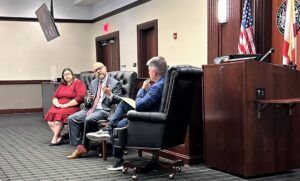One of the most significant actions of the Florida Legislature this year was tort reform.
By putting limits on the amount of money plaintiff’s lawyers can extract from businesses (and their customers), the legislators did all Floridians a favor.
It will affect insurance premiums and the cost of goods, probably not immediately but in large amounts over future years.
Members of the lawyers chapter of the Federalist Society heard a detailed explanation of the changes April 21 at the Duval County Courthouse.
Panelists were Kansas Gooden of the Boyd, Jenerette law firm in Jacksonville and William Large, president of the Florida Justice Reform Institute.

Gooden said the issues addressed in the new law have been debated for the past 10 years and Large gave credit to the governor and leaders of the two houses of the legislature for finally getting it done.
They explained how lawyers have been able to game the system to jack up jury awards, and how the new law weeks to curb some of the abuses.
The law specifies the admissibility of evidence in personal injury and wrongful death cases so that the juries get an accurate picture of medical damages; sets clear guidelines for insurance companies, claimants, and insureds in third-party claims cases in order to reduce third-party bad faith incidents and lawsuits; and changes Florida from a “pure” to a “modified” comparative negligence standard jurisdiction.
Gooden and Large said it will stop the practice of lawyers sending plaintiffs to special doctors who charge huge fees and drive up the size of awards. It also sets definite limits on the time insurance companies must respond to lawsuits, which has been an ongoing problem.
One of the esoteric provisions regards letters of protection, which are sent by plaintiff attorneys to their clients’ health care providers, guaranteeing the provider payment for medical treatment from a future lawsuit settlement or verdict award. Therefore, if the patient is insured, providers don’t bill the insurers, Medicare or Medicaid.
The law doesn’t ban them but allows juries to consider the contracted commercial reimbursement rates for the costs of care as well as Medicare and Medicaid rates when determining future medical expenses.
Large said letters of protection enable plaintiff attorneys to inflate the value of past medical bills and claims their use artificially inflates settlement amounts by as much as 400 percent.
The 131,000 trucking companies in Florida also were staunch supporters of the reforms. Alix Miller, CEO of the Florida Trucking Association, told Florida Politics “Florida is the worst state in the nation for nuclear verdicts, where damage awards exceed $10 million — largely due to the trial attorneys who prey on the trucking industry.”
Scott Shalley, president and CEO of the Florida Retail Federation, said in the Florida Bar News, “Costly, unjust litigation is extremely harmful to retail businesses, costing them millions, putting jobs at risk and forcing them to increase costs on consumers just to break even. With this legislation, we’re bringing justice back to the justice system, increasing protections for both businesses and consumers.”
Although trial lawyers are outraged over the new law, Gooden says it brings Florida into line with many other states regarding several of the key issues. Large added that the law was a bipartisan measure that was debated extensively and went through a number of compromises and changes before passage.
Before the new law, Florida was ranked by the Institute for Legal Reform as 46 out of 50 states in fairness and reasonableness litigation.


